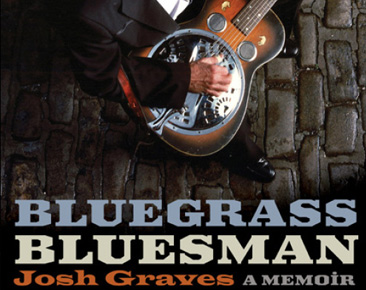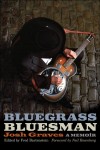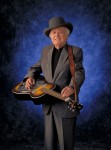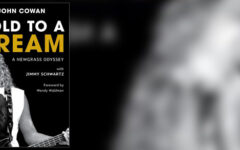
 I spent yesterday with Josh Graves by reading Bluegrass Bluesman: Josh Graves A Memoir, a collection of transcribed interviews given in the ’90s by the resonator guitar master.
I spent yesterday with Josh Graves by reading Bluegrass Bluesman: Josh Graves A Memoir, a collection of transcribed interviews given in the ’90s by the resonator guitar master.
Expertly edited by Fred Bartenstein with help from a lot of good folks, which I’ll come back to in a minute, it also includes never-before-published photos and 24 tributes from musicians and friends, many of which were compiled by Betty Wheeler in 2001 for an honorary presentation to Josh.
But what makes this book so compelling is the voice of Burkett “Buck” “Uncle Josh” Graves himself.
From the first sentence (“There’s a story on me, I guess—where I come from and why.”) to the last (“I’d just like to go back up in the mountains and stay there.”), the voice of Josh Graves takes you on a front-seat ride with one of the most interesting and influential—and too often underappreciated—lives in bluegrass history.
As if establishing the dobro in bluegrass wasn’t enough, Josh was also a great singer, songwriter, bass player, and comedian.
As the straight man to Jake Tullock in the Foggy Mountain Boys comedy routines (which sometimes went 20 minutes in the middle of a show), Josh and Jake also had an amazing vocal duo as heard in these clips of Feast Here Tonight …
… and Hand Me Down My Walking Cane:
http://www.youtube.com/watch?v=wFqdg_VKp8M
In addition to Fireball, Josh wrote over 150 other songs, some of which are classics, such as Foggy Mountain Rock and Wilma Lee & Stoney Cooper’s hit Come Walk With Me.
http://www.youtube.com/watch?v=lFXOu6L3Ybk
The immediate commercial success of that song led to both Lester and Earl offering to buy it from him. Wisely, he kept it.
Fred Bartenstein emailed me a link to BMI’s listing of songs written by Josh Graves. It’s an amazing catalog and a resource for bands looking for songs that have not been covered nearly enough.
There are a lot of great stories in this collection as well as straight talk about life as a sideman in the country and bluegrass bands of the 40s through the 60s. Josh had honest opinions and didn’t pull punches.
There are many intriguing quotes:
“The Callahan Brothers, to me, was the first ones that ever did bluegrass music, really.”
“When you’re young like that, you think the attention and success are going to last forever, but they don’t.”
“Other musicians would come up to Lester and say, “Boy, it’s gone, ain’t it?” And he’d say, “Yeah.” He didn’t want nobody to know we was doing that good…We never suffered a bit when rock hit.”
“Earl didn’t allow nobody to tune on stage. If your instrument was out or you broke a string, you’d go behind the stage, fix it, and then come back. You’d tune to what you heard.”
“You left him [Lester Flatt], buddy, and he wouldn’t speak to you. Oh, he didn’t speak to me for the two years I was with Earl. And tried to hurt me every way he could.”
And many more. To quote Raymond Chandler, it’s “unputdownable.”
The title Bluegrass Bluesman perfectly describes the importance of the blues in Josh’s life. In fact, he called it his first love.
 Josh recalls, “And then I remember one old guy, Buck Roper. He was a black man. . . and he played bottleneck on the banjo. I’d sit there, and it fascinated me, the notes that he would hit, and how he’d curl them around.”
Josh recalls, “And then I remember one old guy, Buck Roper. He was a black man. . . and he played bottleneck on the banjo. I’d sit there, and it fascinated me, the notes that he would hit, and how he’d curl them around.”
And “…my dad would throw a party, maybe once a month, and he’d hire these two black guys. . . I sat at their feet and stayed right with them when they was playing. One had an old taterbug mandolin, I called it—big-bodied thing—and one had an old Silvertone Gene Autry guitar, I guess it was, but they could play!”
Josh also became a fan and a friend of blues giant Lightning Hopkins and there’s a great story about Hopkins’ traveling bar. You’ll have to read the book to find out about it, though.
In the introduction, Fred Bartenstein lays out the circuitous route this project took. Barry Willis, the author of America’s Music: Bluegrass, first interviewed Graves over eight days in 1994. The intent was for Willis to write an “as told to” autobiography of Graves, but the project was never completed.
In 2008, two years after Graves’ death, Willis contacted Bartenstein to see if he might be interested in doing something with the transcript. Unfortunately the original tapes and electronic files had been lost.
Using additional interviews of Josh conducted by Bobby Wolfe in 1990 and Stacy Phillips in 1993, Fred assembled and edited the transcripts into a coherent memoir tracing Josh’s life from his youth in Tellicoe Plains, TN, through his work with Kenny Baker in the ’80s and ’90s.
We owe a huge debt of gratitude to Fred Bartenstein and all the people involved in this project, all of whom are mentioned in Fred’s introduction.
Neil Rosenberg’s foreword concisely describes Josh’s career and his importance to bluegrass music. Thomas Goldsmith added wonderful introductions to each chapter, even coming up with an apt Shakespearean reference when he compares Josh to Hamlet’s friend Horatio.
Goldsmith writes, “Born poor before he became a scholar, Shakespeare tells us, Horatio was a friend to the best and brightest, present at every important moment and a survivor who outlived the mighty and dying to tell the story.”
This past year has seen the release of several great books by the University of Illinois Press: this and Marty Godbey’s biography of J.D. Crowe have not only upped the ante of bluegrass writing, but have put into lasting form the history of two remarkable men and their times.
But, as Josh says, “You can’t get back to the original thing. They’d have to feel the same way they felt then and play like they did then.”
This memoir is the closest thing we have.







